All About Chemical Termite Barriers: Installation, Costs And Safety
Termites eat old buildings and new ones too. Give them a chance, and they will sneak through the cracks. And you don’t want your biggest life investment chewed up by white ants. That’s why installing a chemical termite barrier can save you money and heartache.
Chemical termite barriers benefit new buildings. But they also provide a long-lasting deterrent around existing structures. Because the chemicals have a shelf life, annual termite inspections and retreatment are necessary. We often get asked:
- What is a termite chemical barrier?
- How long do termite barriers last?
- What chemicals do exterminators use for barriers?
- How are chemical termite barriers installed?
- How much do termite barriers cost?
- Are chemical termite barriers safe?
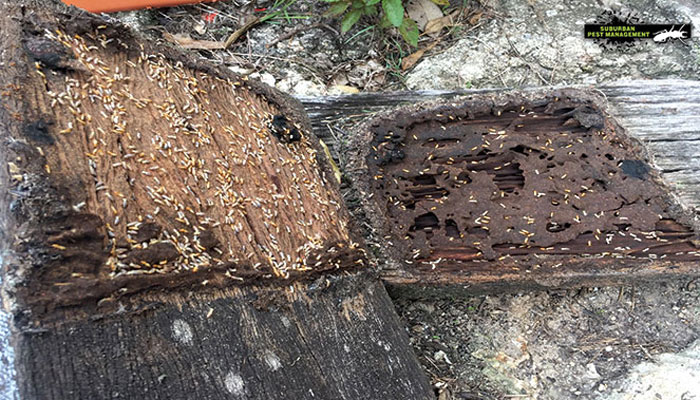
A chemical termite barrier can deter termites from invading a house.
What Is A Termite Chemical Barrier?
A termite chemical barrier acts as a defence system for your building. A pest control expert spreads a liquid chemical, known as a termiticide into the soil. The barrier either runs around the perimeter of your building or under the concrete slab.
A chemical termite barrier that poisons rather than repels is a practical solution. It gets rid of the pests that are eating away at your home rather than sending them away to try a different path.
You should consider a chemical termite barrier if:
- You’re about to build a new home with a slab-on-ground foundation.
- Your home is prone to subterranean termites.
- You’re building a commercial building with materials subject to termite attack.
- You have an existing commercial building which is prone to termites.
If you’re building a new home on top of a concrete slab, a chemical termite barrier will likely include a physical termite barrier designed to last the life of the building. If you have an older home, you can still have a trench barrier dug around the outside of your building at any time. Although, if you’re renovating it’s an ideal time; it would be a huge shame if you spent a huge deal of time and money on home improvements only for termites to undo all of your hard work.
Physical Termite Barriers can assist in creating a complete management approach to termite protection
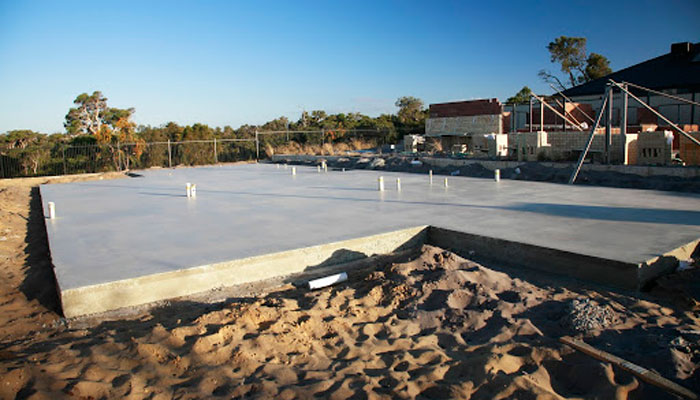 Slab-on-ground foundation’s best defense is a liquid termite chemical barrier.
Slab-on-ground foundation’s best defense is a liquid termite chemical barrier.
How Long Do Termite Barriers Work?
Decades ago, chemical termite barriers lasted up to 30 years. These stable chemicals had a much longer shelf life, but they were terrible for the environment and for humans.
Today a full chemical termite barrier lasts as long as eight years. Though some chemical treatments only last a few years. The length of service depends on the type of chemical, the way it’s applied to the soil and any treatment limitations that may apply.
While newer termiticides don’t last as long as those from before the 1990s, they are:
- Better for the environment.
- Safer for pets
- Safer for people
- Actually, eliminate termite colonies instead of just deterring
And a termite barrier, chemical or otherwise is no guarantee against termites. Although regular yearly inspections can tighten your termite security. A licensed pest exterminator knows how to defend your home from these hungry pests.
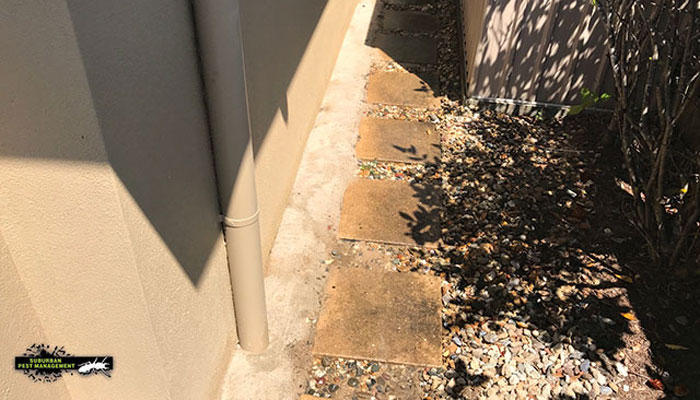
Physical termite barrier combined with a chemical termite barrier.
What Chemicals Do Termite Exterminators Use For Barriers?
A pest control technician can only use chemicals registered on the pesticides registrar. A termiticide can have one or two functions.
- It can repel termites sending them away from the barrier.
- It can destroy termites and termite colonies.
If you only use a repellant chemical, you risk having the termites return. They won’t go away forever. Give them time, they’ll find the smallest crack in your termite barrier. Besides tunnelling up under your property, termites also fly. So, poisoning the nest is best.
A termiticide that destroys sends termites away for good. Not only do they ingest the chemical, it also covers them and they take it back to the nest. As they come in contact with other termites, it spreads through the colony. It kills workers, queens and larvae.
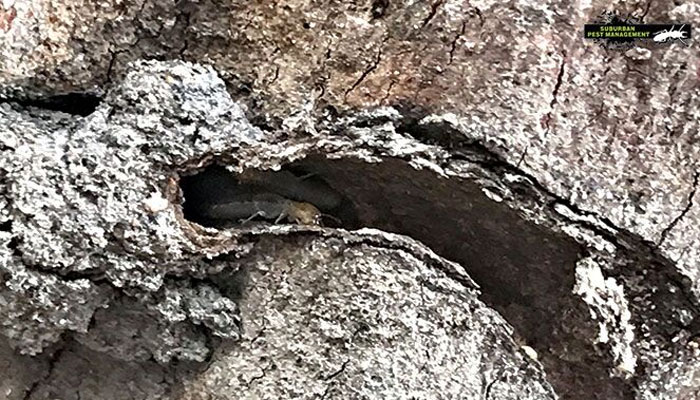
Termite exterminators search for all signs of termites.
How Are Chemical Barriers Installed For Termite Protection?
The first step is to dig a trench around the building. Then a termite exterminator adds a liquid termiticide into the soil. It creates a continuous treated soil zone called a chemical termite barrier.
The exterminator drills holes into the ground where there is pavement or cement. The technician pumps the termiticide into the soil through the holes. They are then plugged up. You can match the colour of the plugs for the holes with the colour of your walkway or tile.
Even houses with concrete stumps set off the ground need termite protection. If termites have been there before, they leave a scent behind. It encourages other termites to seek it out.
A second method uses a reticulation system. It replenishes the soil with the termiticide, so it is even and continuous. If you’re building a new home, it goes in before the concrete slab.
New rules surround slab-on-ground homes with a liquid chemical termite barrier. Since 2017, they may also require a reticulation system.
You can also install a termite reticulation system around an established building. This makes future replenishment much easier. A good time to install a reticulation system for termite protection is when you’re renovating or installing new concrete or pavers around the building.
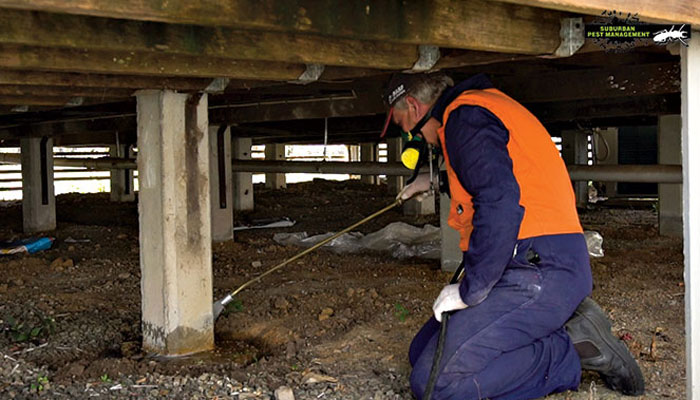
Houses with cement stumps still need termite protection.
How Much Does A Chemical Termite Barrier Cost?
Termite prevention costs far less than fixing the termite damage. While you can treat a limited area for an immediate solution, it’s not a permanent solution.
A full liquid chemical termite barrier protects a building from all fronts for up to 8 years. Because it involves digging trenches and drilling holes, it’s labour intensive.
The only extra cost you should factor in is an annual inspection. Unless you already have termites and then you should also consider a local treatment. You can also combine it with termite bait stations for a complete solution.
Not doing anything about it is worse. Insurance doesn’t cover termite damage. So, the cost of a chemical termite barrier is worth it to protect your investment.
Depending on the size of your perimeter, a full treatment can cost somewhere between $1,500 to $5,000.
There are cheaper alternatives, such as those that use a repellent termiticide. But repelling termites doesn‘t get rid of the problem. Termites will return if:
- They find a weakness in the barrier.
- You accidentally leave wood leaning against the building.
- You forget to re-treat the barrier in years to come.
Cheaper alternatives will cost you more. You can check our Pest Control Prices And Costs For Pest Treatment Services page if you want to know more.
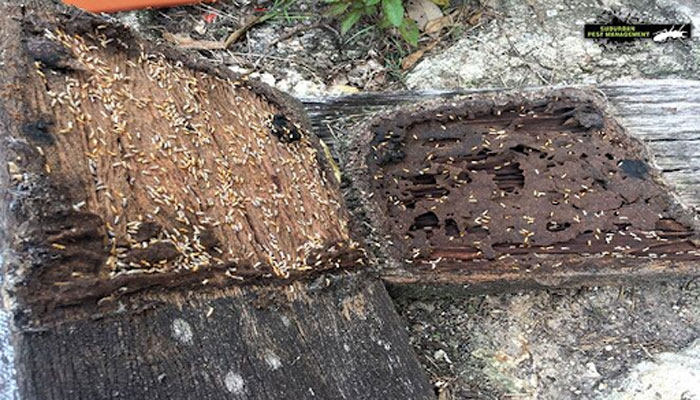
A termite barrier costs far less than the cost of replacing a house from termite damage.
Are Chemical Termite Barriers Safe?
Organochlorine insecticides were the first chemicals used as liquid termiticides in the 1950s. They were slow to break down but toxic to humans and the environment. Public concern led to the phasing out of these chemicals by mid-1990.
Nowadays you can only use a chemical that’s listed on the Australian pesticides register. Registered chemicals must pass strict safety requirements.
While today’s pesticides don’t last as long, when used in accordance with the product label they are eco-safe. They won’t harm children, pets, plants or wildlife..
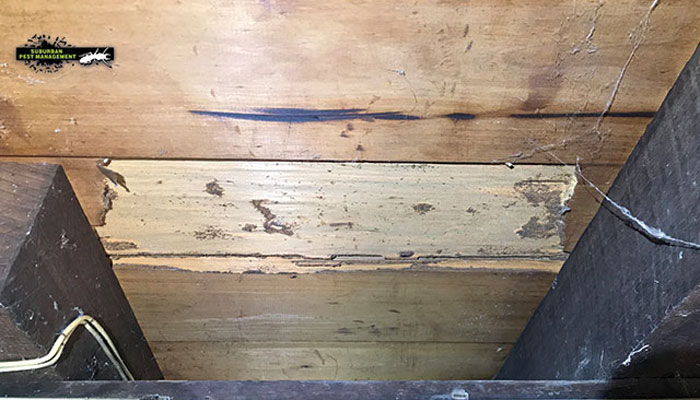
Chemical termite barriers are safe for the whole family, but not for the termites.
Give Suburban Pest A Call Today
Take control of your property with the help of Suburban Pest Management. Secure your building from invading termites. We provide the best price to quality ratio in the market. Don’t wait for a termite problem to eat down your door. Defend your building with a chemical termite barrier.
Call Now: 1300 65 65 72 or Get A Free Quote.
